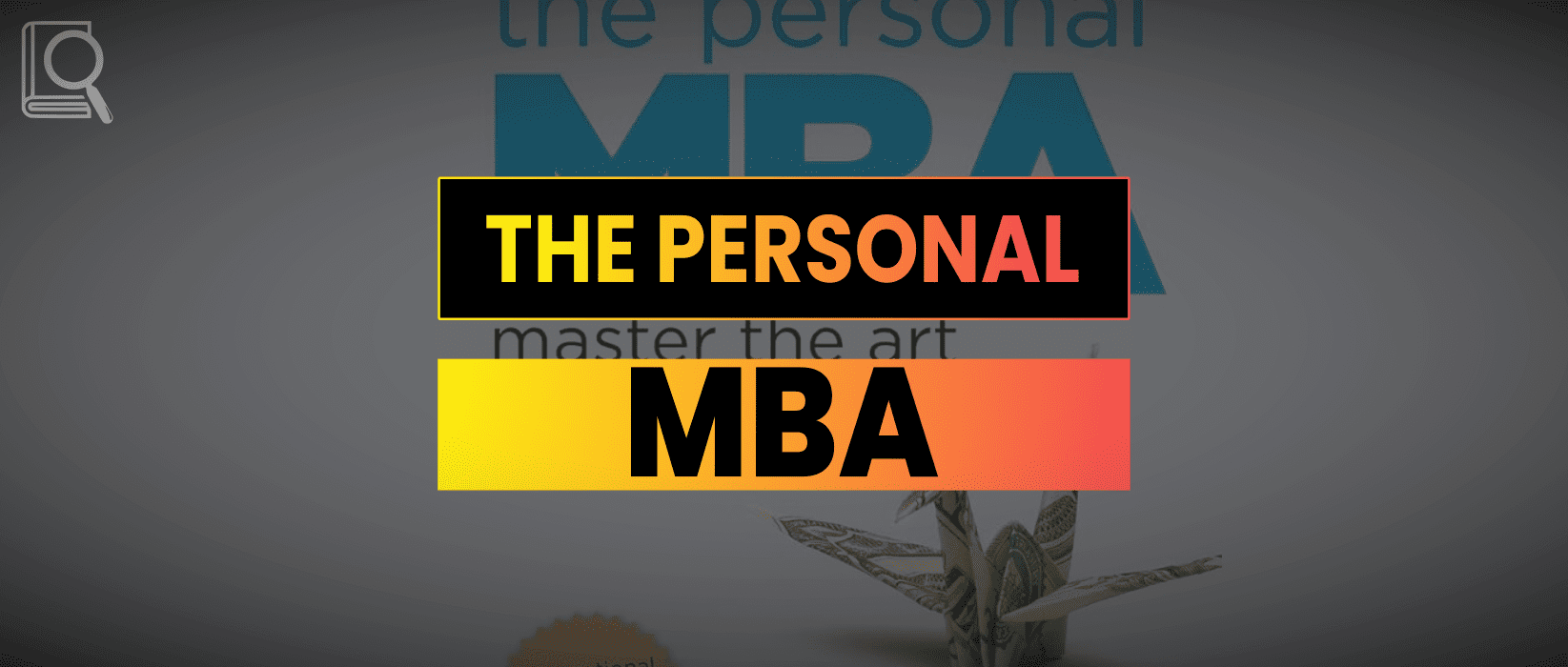At its core, The Personal MBA by Josh Kaufman argues that traditional business school education is neither necessary nor cost effective for acquiring practical business knowledge. Instead, individuals can attain a comprehensive and high quality business education through focused self study, deliberate practice, and real world application.
Kaufman presents a self education framework and an integrated curriculum of foundational business concepts that empower readers to master business principles without the expense or inefficiencies of a formal MBA.
The book’s central proposition is that business is not rocket science it’s a set of predictable, learnable skills grounded in behavioral psychology, systems theory, and value creation. By distilling essential knowledge across disciplines such as marketing, sales, finance, negotiation, operations, and productivity, Kaufman aims to democratise access to elite business education.

Josh Kaufman is a former Procter & Gamble brand manager turned business consultant, researcher, and educator. He is best known for advocating self directed learning and for challenging the conventional education system’s assumptions. Kaufman holds no formal MBA himself; instead, he used extensive research, curated reading, and hands on business experience to create his own business education. His approach has resonated globally with entrepreneurs, managers, and self learners, and The Personal MBA has become a bestseller and a foundational text in alternative business education.
Value Creation and the 5 Parts of Every Business
Kaufman’s foundational model is that every business can be understood as comprising five interdependent components:
- Value Creation – Discovering what people need and want, then creating it.
- Marketing – Attracting attention and building demand for the product.
- Sales – Converting prospects into paying customers.
- Value Delivery – Delivering the promised value to the customer efficiently.
- Finance – Earning more than you spend and managing resources.
This model becomes a structural lens through which every business activity can be examined. It reveals where value is created, where it can break down, and where improvement is possible.
The Iron Law of the Market
No business can succeed without a market that wants what it’s offering. Kaufman introduces the “Iron Law of the Market” as the primary driver of success. You must create a product that aligns with an existing, clearly defined need or desire. The law emphasizes the futility of trying to create demand for something people don’t want.
Ways to Evaluate a Market
Kaufman proposes criteria to assess whether a business idea has real potential, including:
- Urgency (how badly customers need it)
- Market size
- Pricing potential
- Cost of customer acquisition
- Scalability
- Competition
- Customer lifetime value
These evaluation tools function as a pre launch litmus test and decision making framework.
Rather than relying solely on product based thinking, Kaufman outlines standard forms in which businesses deliver value, such as:
- Products
- Services
- Subscriptions
- Resale
- Leasing
- Agency
- Audience aggregation
- Licensing
- Certification
Understanding these forms helps entrepreneurs expand their revenue models and innovate more effectively.
The Pricing Uncertainty Principle
Pricing is not a fixed science. Kaufman argues that price is determined not by the cost of production but by the customer’s perception of value. The Pricing Uncertainty Principle underscores that businesses can often charge far more than they assume if they can justify and communicate that value convincingly.
Sales Psychology and the Conversion Funnel
Drawing on behavioral economics and cognitive biases, Kaufman explores how customers make buying decisions. He frames the sales process as a conversion funnel with five steps: Awareness Interest Evaluation Trial Purchase.
He discusses the role of trust, risk reversal (like guarantees), and framing in influencing purchase decisions. Sales, at its essence, is helping the customer solve a problem without manipulation or pressure.
Systems Thinking and Bottleneck Analysis
Kaufman introduces basic systems theory to help readers think about businesses as dynamic, interconnected systems. He stresses the importance of identifying bottlenecks the single constraint that limits performance and optimizing it to enhance overall output.
Financial Literacy for Non Finance People
The book explains fundamental financial metrics without jargon:
- Revenue – Total income from sales.
- Profit – Revenue minus costs.
- Cash Flow – Timing and movement of money in and out of the business.
- Return on Investment (ROI) – Efficiency of capital use.
- Break Even Point – When revenue equals cost.
Kaufman also warns against financial illusions growth without profit, poor cash flow management, and overleveraging.
The Personal Efficacy Framework
Personal productivity, Kaufman argues, is the foundation for business productivity. He synthesizes best practices from cognitive science and GTD (Getting Things Done) to boost individual performance. Key ideas include:
- The importance of working memory and mental bandwidth
- The cost of context switching
- Time blocking and single tasking as productivity multipliers
- Creating systems for decision making, not relying on willpower
Antifragility and Iteration
Inspired by Lean Startup principles and systems theory, Kaufman champions iterative testing over long term planning. He encourages entrepreneurs to:
- Launch small experiments
- Gather real data
- Adapt in real time
This agile mindset reflects the reality that most business plans don’t survive first contact with customers.
Trust, Brand, and Reciprocity
Reputation is a critical intangible asset. Kaufman explores how trust is built through consistency, competence, and ethical alignment. A strong brand is not just a logo it’s a promise delivered repeatedly.
Reciprocity, a principle rooted in psychology, is a powerful driver of loyalty. Providing unexpected value can transform prospects into advocates.
Decision Making Opportunity Cost and Expected Value
Kaufman uses the concept of opportunity cost to reframe all choices. Every “yes” is a “no” to something else. He also introduces expected value as a way to evaluate probabilistic outcomes: multiply potential reward by the probability of success to make rational decisions under uncertainty.
Avoiding Cognitive Biases and Mental Errors
Business success is often about judgment. Kaufman surveys over a dozen cognitive biases (confirmation bias, sunk cost fallacy, anchoring, etc.) and provides strategies to reduce their influence. Awareness, reflection, and structured thinking help mitigate these distortions.
Learning as a Business Skill
Learning is positioned as a core competitive advantage. Kaufman introduces “meta learning“, the ability to learn how to learn. Key strategies include:
- Spaced repetition
- Mental models
- Deconstructing complex skills into sub skills
- Practice loops with feedback
These tools allow entrepreneurs to rapidly acquire new competencies, outlearn competitors, and adapt to change.
Takeaways
- A traditional MBA is not a prerequisite for success in business; focused self study can yield better ROI and more practical knowledge.
- Every business, regardless of industry, has five core functions value creation, marketing, sales, value delivery, and finance. Weakness in any area undermines the whole.
- A market driven approach solving real problems for real people is the only sustainable path to success. Start with the Iron Law of the Market.
- Evaluate business ideas systematically using Kaufman’s ten market criteria to avoid wasted effort and capital.
- Explore beyond physical products there are twelve forms of value. Recognise and deploy multiple revenue models for greater leverage.
- Price is a signal of perceived value, not cost. Charge based on outcomes and transformation, not input.
- Effective sales is ethical problem solving. Guide people through decision making, reduce perceived risk, and build trust.
- Think of your business as a system. Identify and address bottlenecks to unlock performance improvements.
- Understand basic financial concepts revenue, cost, profit, cash flow, and ROI. These are non negotiable for decision making.
- Productivity is strategic. Guard your attention, avoid multitasking, and work in focused sprints. Create systems for habits and decisions.
- Success comes from learning fast and iterating. Small experiments trump elaborate plans. Data, not guesses, drives progress.
- Trust is earned through reliability and delivery. Build your brand around a consistent promise and exceed expectations.
- Make decisions using opportunity cost and expected value. Say “yes” only when the upside justifies the trade off.
- Recognise and mitigate cognitive biases. Better decisions come from structured thinking and reflection.
- Treat learning as a lifelong skill. Use mental models, chunking, and feedback loops to grow faster than competitors.
The Personal MBA delivers on its promise a rigorous, comprehensive business education accessible to anyone. Kaufman removes the mystique from business and replaces it with clarity, logic, and psychological insight. His framework encourages action, reflection, and self reliance qualities far more critical than a degree. Whether you’re launching a startup, managing a team, or rethinking your career, the book offers enduring principles that can shape decisions, drive growth, and foster lifelong competence.
https://www.amazon.co.uk/Personal-MBA-World-Class-Business-Education/dp/0670919535



